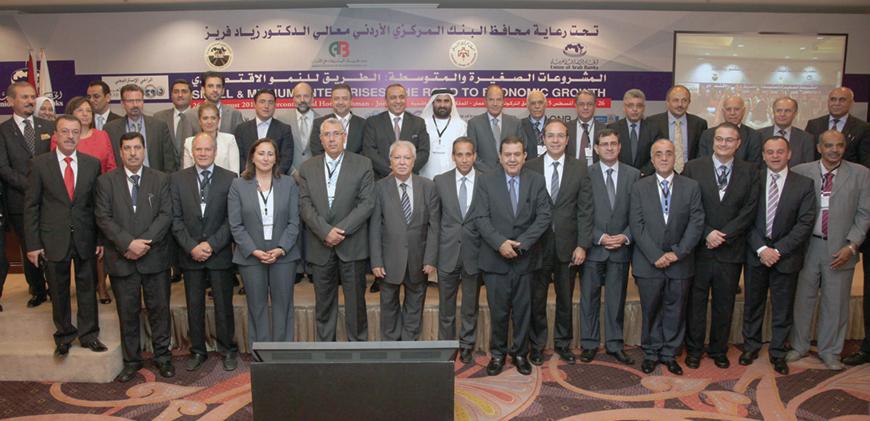You are here
Limited access to finance hindering private sector in Jordan — study
By Khetam Malkawi - Jul 27,2016 - Last updated at Jul 27,2016
AMMAN — Almost a third of all Jordanian firms report limited access to finance as the top obstacle to their operations, the highest proportion among countries surveyed in the region for a new report.
The MENA Business Climate 2016 report, released on Monday by the European Bank for Reconstruction and Development (EBRD), the European Investment Bank (EIB) and the World Bank Group (WBG), suggested that cyclical factors might partly explain this result.
“In 2012, the reference period of the survey, Jordan experienced several adverse shocks,” the report said, noting that reductions in the gas supply from Egypt at that time forced Jordan to resort to more expensive fuel imports, putting pressure on the current account and reserves as well as the budget.
Public debt also increased from 71 per cent of the GDP in 2011 to 82 per cent in 2012, potentially crowding out the private sector.
“These adverse shocks also decreased firms’ propensity to invest and hence reduced their demand for credit,” the report stated, adding that tax rates were cited as the top obstacle for nearly a quarter of all firms, possibly linked to an increase in the time it takes to prepare, file and pay taxes.
Political instability was a factor, too,the report found.
“Jordan faces security challenges mostly as a result of spillovers of regional turmoil.”
These problems notwithstanding, firms in Jordan experienced a relatively small drop in sales and a robust growth in employment between 2009 and 2012, according to the report.
A statement on the report, a copy of which was made available to The Jordan Times, said the private sector could be an important driver for growth and rising prosperity in the region if effective policies were put in place to address key challenges.
The report surveyed more than 6,000 firms in Djibouti, Egypt, Jordan, Lebanon, Morocco, Tunisia, the West Bank and Gaza, and Yemen.
Many of those firms cited political instability, corruption, unreliable electricity supply and inadequate access to finance as factors that were holding them back, according to the statement.
The report also found that innovation and growth were constrained by barriers to trade and a scarcity of appropriately trained workers. In many places, there is a disconnection between firms and formal financing channels, with the result that firms are losing growth opportunities, the study said.
The report added that “strategies to support firms in enhancing their productivity, as well as the process of resource reallocation towards more productive firms, should be a high priority for public authorities in the region”.
Meanwhile, the report found that although Jordan has comparatively deep financial and banking sectors, with private sector credit to GDP accounting for about 70 per cent of GDP from a peak of around 90 per cent in 2007, bank loans account for only 10 per cent of financing to small and medium enterprises (SME) in Jordan.
Data indicate that loans to SMEs account for about 10 per cent of total loans, which could explain the divergence between measures of financial depth and financial access.
Only 64 per cent of firms — second lowest after the Republic of Yemen — are not credit-constrained, compared with an average of 73 per cent in the surveyed countries.
Moreover, more than a third of Jordanian firms report being discouraged from applying for a loan due to strict terms and conditions.
According to the report, the proportion of women among the full-time permanent employees in the surveyed countries is very low by international standards, and Jordan compares relatively poorly with other economies in the region.
Only 8 per cent of the workforce in a typical Jordanian firm is female, compared with an average of 17 per cent for the other surveyed economies, the report added.
Jordanian manufacturing firms are competitive by regional standards. Jordan ranked highest of the surveyed countries in the World Economic Forum Global Competitiveness Report 2013–2014.
“Jordan’s manufacturing firms are relatively well integrated into international trade, with 26 per cent of them both importing and exporting, compared with the averages of 20 per cent in the region and 13 per cent in upper-middle-income economies,”the MENA Business Climate report found.
Related Articles
AMMAN — Developments in the region, especially the drop in oil prices, require a "genuine" stance to empower small-and medium-sized en
AMMAN — Moody's Investors Service affirmed Jordan's long-term issuer and senior unsecured ratings at B1 and maintained the stable outlook fo
AMMAN – Access to finance poses the main constraint for Jordanian firms, according to a recently released survey prepared by the European Ba













